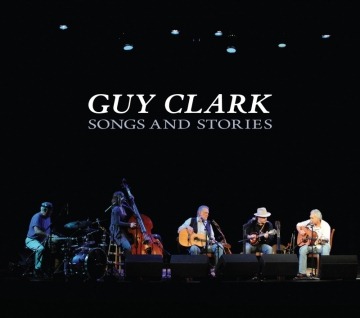
Guy Clark: Songs and Stories
Written by: Pat King, Special to CC2K
 If you like roots-country or folk music or even just love great songwriting, then you should definitely check out Guy Clark’s new album, Songs and Stories. Though it’s a live album, it’s a great introduction to his work. Literally in some cases, since, as the title of the album suggests, Clark gives us little snippets of information about the songs he plays or an interesting anecdote related to its creation as an introduction to several songs.
If you like roots-country or folk music or even just love great songwriting, then you should definitely check out Guy Clark’s new album, Songs and Stories. Though it’s a live album, it’s a great introduction to his work. Literally in some cases, since, as the title of the album suggests, Clark gives us little snippets of information about the songs he plays or an interesting anecdote related to its creation as an introduction to several songs.
I think this album must have been recorded in a small venue, in front of a relatively small audience. When Clark tells his stories, listeners can be forgiven for thinking that he’s talking directly to them. Like an eccentric Texas uncle who tells old stories on the front porch of an old wood house in the middle of nowhere, Guy Clark can spin an old country yarn. And the stories are almost as good as the songs. Almost.
The sound is great. Very clear, you can hear all the instruments. I’ve listened to some big rock bands’ live albums and didn’t like them. The music sounded flat, as if the instruments and vocals had been smashed together. Plus there was too much ambient noise. That’s why I used to tell people that I didn’t like live albums. When you listen to Songs and Stories, you can imagine yourself in the audience, in the front row of a small theater. It’s like sitting in a coffeehouse somewhere, listening to a passionate singer-songwriter and his band. Except, of course, you’re listening to Guy Clark, one of the two greatest country-folk musicians to survive the seventies. The other member of the duo being the great Townes Van Zandt.
And speaking of Van Zandt, Clark covers his song, “If I Needed You,” one of the most soaring and beautiful tributes to hard-fought love ever pressed to wax. As Clark tells it, Van Zandt was living with him when he wrote the song. Van Zandt transcribed this near-perfect love song after waking from a dream. Astonished to hear that such a complete encapsulation of devotion, longing and heartache had been written while Van Zandt was essentially on autopilot, Clark remarks to the audience, “Suspicions confirmed,” and laughs sweetly as he remembers his old friend. And then they play the song. The fiddle player makes his instrument weep as Clark sings, “If I needed you / would you come to me? / Would you come to me and ease my pain?” Wonderful stuff.
As a brief aside, I feel like I should mention that Clark is also damn good at writing these kinds of heartsick-devotion tunes. Though it’s not on the album, one of his best known songs is “Like a Coat from the Cold.” Fellas, if you wanna make your girl’s heart melt, try singing these lines to her: “But the lady beside me / is the one I have chosen / to walk through my life / like a coat from the cold.” Sure, the lyrics don’t make too much sense, but the sentiment is so strong it more than makes up for a bad simile. Let her know how you feel, boys.
Guy Clark is getting old now, pushing seventy. You can hear it in his singing. His voice was never polished, far from it. But now it has that great kind of scratchy life-worn moan to it. There’s something wonderful about hearing the age in a singer’s voice. It means that the fucker has weathered the years and survived. This is good. Poor ‘ol Van Zandt drank himself to death. The Laughing God is so good at fucking you up that just making it to your twilight years can be an accomplishment. Besides, the extra years add another dimension to the older songs, the ones that were recorded so many years ago by a much younger man. I mean, there’s just something magic about hearing old Guy Clark as he sings a song like, “Maybe I can Paint over that,” a song about a man’s realization that, try as he might, he can’t hide his flaws from the woman he loves.
Get this album and turn the lights low and listen to it with your eyes closed. Poof! You’re right there. Or he’s there. But what’s the difference? Time is irrelevant when we’re inside the music. Especially this kind of music. It seeks to exist and, in beauty, persist.
